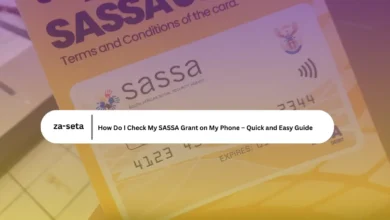SASSA Old Age Grant Means Test 2025: Maximum Income & Asset Limits for Pension Qualification

Learn the 2025 income and asset limits for the SASSA Old Age Grant. Find out who qualifies—single or married—and how to assess.
Why SASSA Uses a Means Test
SASSA’s means test ensures that the Old Age Grant reaches those most in need. It balances fairness and resource allocation, using both income and asset thresholds to limit eligibility to individuals or couples with modest means. In 2025, these numbers remain steady in the mid‑hundred thousands range.
2. Maximum Income Allowed – 2025 Update
Single Applicant
To qualify as a single person:
- Annual income must be ≤ R96,840, which translates to a monthly cap of R8,070
- This includes income from pensions, rentals, investments, freelance gigs—and even financial support from working children
Married Couple
For applicants married or in a legally recognized union:
- Combined annual income must not exceed R193,680, i.e. R16,140 monthly
- Both earners’ income is included—even if only one receives the grant
3. Asset Thresholds Explained
Assets are assessed in addition to income:
Single Applicant
- Asset limit: R1,372,800
- This includes savings, investment accounts, vehicles, or additional property—not your primary residence
Married Couple
- Combined asset limit: R2,745,600
- All assets held jointly or individually count toward this threshold
4. What Counts—and What Doesn’t
It’s key to know which items affect your means test:
Included
- Cash savings, fixed deposits, shares
- Personal and investment properties (not your primary home)
- Vehicles (value >R23,000)
- Interest, rental income, annuities, etc.
Excluded
- Your primary residence—the homestead you live in
- Basic household goods—furniture, appliances, and tools
- A modest vehicle valued under R23,000
- Personal clothing, bedding, and medical aids
5. Income Sources That Matter
SASSA includes many income streams:
- Retirement and provident fund payouts
- Rental income
- Dividends and interest from investments
- Casual income‑earning activities
- Financial support from adult children living elsewhere
It’s wise to review your entire income before applying.
6. How the Means Test Is Calculated
SASSA sums up:
- Total income for applicant(s) in the prior tax year
- Value of all assets (excluding primary home and essential goods)
- Compares against current income and asset limits
- Approves or declines the grant based on your total eligibility
7. Five-Step Check Before Applying
- Add up all income sources from the past year
- Total your assets, excluding primary home
- Compare to limits (individual, couple)
- Double-check calculations or ask a relative for help
- Proceed with confidence if under both thresholds
How to Apply: Documents You’ll Need
To apply for the pension grant, prepare the following:
Required by All:
- Certified ID copy
- Proof of residence (municipal account or sworn affidavit, ≤ 3 months old)
- Bank account details (bank statement or confirmation letter)
- All income proof: latest payslips, bank statements, or proof of rental income
- APPLICATION PROCESS
- Asset declarations: title deeds, vehicle documentation, investment statements
If Married:
- Both partners’ documents, including residence proof and IDs
If Widowed or Divorced:
- Death certificate or decree of divorce
With these completed, submit them at your nearest SASSA office or apply online via their portal.
9. What Happens If You Surpass the Limits?
9.1 Temporarily Ineligible
- Exceeding thresholds makes you ineligible. You might still reapply later if your situation improves.
9.2 Partial Eligibility
- Rental homes count as income—be transparent. If your main residence is owned outright, it doesn’t affect your eligibility.
9.3 Mid-year Changes
- You can only reapply when your financial circumstances or assets drop enough to meet the limits again.
10. Tips to Lower Your Means Test for Qualification
Though manipulation is illegal, you can:
- Pay off debt or settle vehicle finance
- Transfer non-essential assets (vehicles or savings)
- Rent out property—declare relevant income
- Restructure investments to fall within allowance thresholds
Always seek professional financial advice when rearranging assets.
11. Marital Status, Inheritance, and Grant Eligibility
Married Couples
- Income and assets are combined—an extra earner makes applying less likely.
- Couples separated in practice but still legally married count as married by SASSA.
Inheritance or Sale
- Inheriting property or selling assets could push asset value over the limit—waiting 12 months after the transaction may help.
Divorce or Widowhood
- Your separate income/assets after divorce or widowhood determine future eligibility.
12. Pitfalls to Watch Out For
- Not counting casual rental income—even Airbnb counts
- Forgot asset sale gains—use proceeds to reduce your estate
- Thinking your home is counted—it’s not, but retained in your name
- Using incorrect documents—check certification dates
- Not disclosing all income streams—e.g., adult children’s support
Keeping details accurate is key to avoiding rejection.
13. Real‑Life Scenarios
Scenario A: “Janet the Pensioner”
Janet earns R6,500/month from a rental flat, plus R3,000 pension—making R9,500/month, above the R8,070 individual limit. She is currently ineligible but plans to reduce rental income to qualify.
Scenario B: “Paul and Mary—Married”
Together, their pensions total R12,000/month, below the R16,140 cap. They qualify jointly.
Scenario C: “Samuel After Inheritance”
Samuel sold a small plot of land worth R500,000—exceeding asset limit. He now holds proceeds under R1.3M. He’s qualified once proceeds fall beneath the asset limit.
14. Five‑Step Plan to Qualify
- Complete financial review – tally all income and assets
- Legal documentation – certified within 3 months
- Reduce assets/income where feasible
- Submit with confidence once under limits
- Reapply annually—situations can change quickly
15. Final Thoughts & Your Rights
The SASSA pension means test is designed to support those with the greatest need—not prevent access. By understanding income limits, preparing early, and tracking finances, you can secure this vital support.
Your rights as an applicant:
- To a fair review
- To contest rejections
- To understand the decision made by SASSA
Disclaimer
This article is for informational and educational purposes only. It is not affiliated with, endorsed by, or officially connected to the South African Social Security Agency (SASSA), the Department of Social Development, or any government institution.
While we strive to ensure the accuracy and timeliness of the information provided, we do not guarantee the completeness, reliability, or suitability of this content for your individual circumstances. Readers are advised to consult directly with SASSA or visit their official communication platforms for the most up-to-date and accurate information.
The steps, timelines, and outcomes described may vary depending on your personal details, eligibility status, and government updates. We are not responsible for any decisions made based on this content.
If you are unsure about your grant status or need help with your application, please contact SASSA directly at 0800 60 10 11 or visit your nearest SASSA office.


